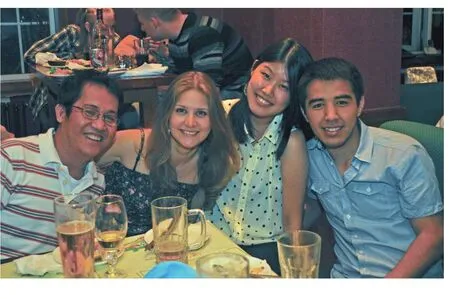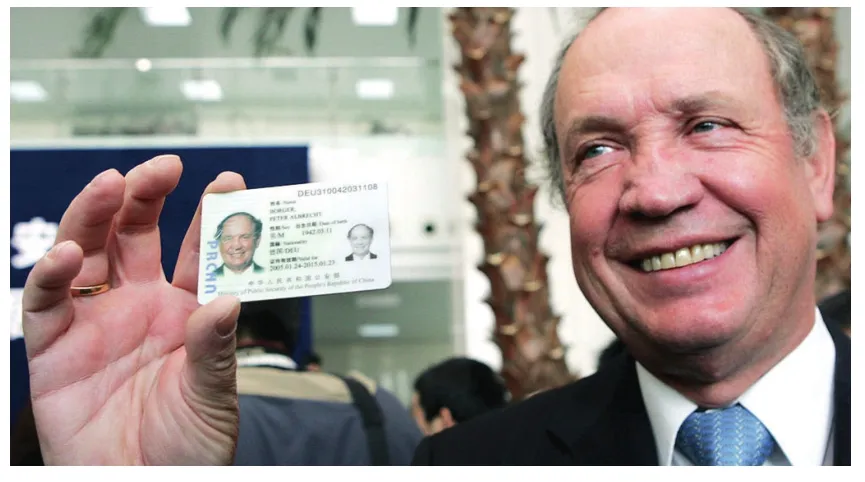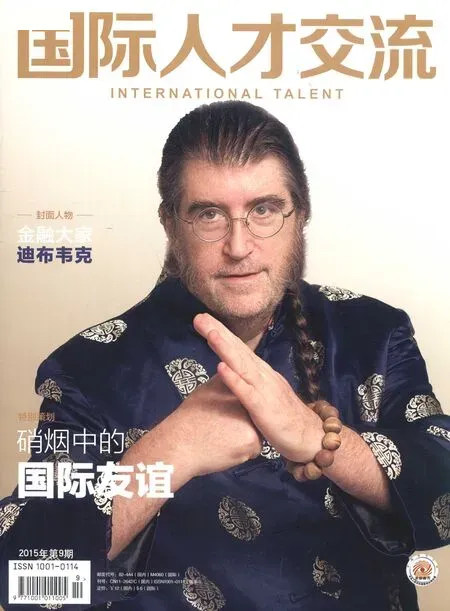我的中国留学生活
文、译/ANASTASIA SUKHORETSKAYA
我的中国留学生活
My life in China as a foreign student
文、译/ANASTASIA SUKHORETSKAYA

对于每一个选择汉语作为第一外语或者第二外语的学生来说, 能有机会去中国学习汉语实为幸事。目前,中国的发展吸引着全世界的目光,越来越多人愿意离开故土,到中国发展。以学生的身份来中国很方便。中国的教育跟西方国家比起来更便宜一点,但如果“死磕”功课不是你唯一的选择,学习之外你还想尝试充满活力的都市夜生活,那你也会花费不少。
For every student who chose to study Chinese as their second or first foreign language, it is a blessing to go to China to master their Chinese. Since nowadays China is hitting headlines, more and more people are willing to leave their home country and venture into China. It is easier to get into China being on a student’s status. Chinese education is not as expensive as, say, Western, but it also will cost a lot of money if grinding away at your studies is not enough and you would also like to engross into vibrant city nightlife.
到中国学习汉语的最佳途径就是申请奖学金。中国为国际学生提供了慷慨的奖学金项目。幸运的外国申请人可以获得孔子学院奖学金、中国政府奖学金、北京市政府奖学金以及中国大学的奖学金。这些奖学金覆盖学费、住宿费、生活费,甚至每个月给学生提供助学金。这些奖学金项目有针对一年或两年进修汉语课程的,也有针对攻读本科、硕、博士学位的。
The best way to become a student in China is to earn a scholarship. China is rather generous on scholarships. The lucky applicant can get Confucius Institute scholarship, Chinese Government Scholarship, Beijing City scholarship, Chinese universities scholarship and all of them provide full or partly coverage of tuition fees, accommodation fees andeven issue living allowance – a monthly stipend. The scholarship can be for a one-year or two-year language program, bachelor, master or doctorate degree.
选择一个去学习的城市也并非易事。有人说,要想学好中文,初学者先到小城市会更好一些,因为在小城市你遇到外国人的可能性不大,而且享受夜生活的机会也不多。但这也会带来另一个问题:你可能会学到不标准的口音,比如南方口音或北方口音这些和普通话不同的方言,这对学习语言也是个障碍。众所周知,最好的大学、最好的教师和质量最高的语言课程都集中在大城市。此外,毕业后你在大城市找工作更容易。当然,大城市的高生活水准也有相应高的生活成本。
The choice of a city where to study Chinese also doesn’t come easy. Some say it is better for a beginner to start from a small city or town as it is out of possibility you will meet many foreigners and there will be less intensive nightlife if any. Though the tricky part is that you risk picking up some Southern or Northern Chinese accent, different from what you will hear in the capital, in your Chinese speech. It is true that the best universities are located in big cities. Best teachers, best language programs are also there. Moreover, it is easier to find a job after graduation in a big city too. Of course, living standards are higher and living cost is more expensive.
2009年,我第一次来到中国,在北京外国语大学学习中文。我在俄罗斯的母校上大四时获得了孔子学院奖学金。当时我对中国一无所知。虽然在我来北京之前已经学习了两年中文,但我只能说几句日常用语,掌握的语法规则也不完整。我们班只有一位中国教师,所以听中国人说话的机会很少。来北京以后,我非常努力地学习,想取得更好的成绩。另外,为了充分利用这次机会,我选择了“跳级”,直接选择了比我应该学习的级别更高的汉语课程。我希望这样能快速提高我的语言能力,因为我只有半年的时间,不得不努力。我和同学们合作做作业,请老师为我答疑解惑。我“钻”进了课本和考试,结果令人欣喜。我通过了汉语水平考试,而且成了班里最优秀的学生。我“跑赢了”我的同学,带着“优秀学生”的称号回国了。当然,在这期间我也经历了困难,比如孤独感和绝望感,特别是当我第一次感冒时,我自己不知道怎么买药。然而,友好的中国人给我留了很好的印象:我在北外的中国朋友把我送到医院。直到现在,我仍然记得她对我的帮助。完成半年课程后,我回国了,但我默默许愿,我一定还会回来。
I came to China first in 2009 to study Chinese in Beijing Foreign Studies University. At that time, I was a 4th grade student at my home university when the Confucius scholarship program found me. I was ignorant of China, though I had studied the language for already two years before my coming to Beijing, but I could utter only a few colloquial words and was more or less aware of some grammar rules. At my home university, we had only one native Chinese teacher and all other subjects were not taught in Chinese either so the opportunity to hear a Chinese speech was very reduced. Then, in Beijing, I struggled to get well in classes. Moreover, I, assuming I needed to use the chance to its fullest, upgraded to a higher-level class than I actually should study in. I hoped it could boost my language proficiency, and since I had only half a year at my disposal, I had to study hard. I cooperated with my classmates and asked teachers to explain things for me that I could not comprehend. I dived into books and exams and the result was astonishing. I passed the HSK and finally became the best student in the class. Surprisingly, I outperformed my classmates and left Beijing with a fancy “Outstanding Student” diploma in the pocket. Of course, there were also bad sides like feeling of loneliness and some sort of despair at the beginning and especially, the feeling of hopelessness when I got down with a flu and was not able to buy medicine on my own. However, another very positive impression on China was the Chinese people who are very friendly and ready to give a hand. My Chinese friend who studied at BFSU at that time came to my rescue and accompanied me to the hospital. Until now, I still remember how kind she was to me. After completing half a year of studies, I came back to Russia making a wish I would return.
第一次来中国我就爱上了北京和中国文化。按我原来的计划,2011年我回到中国,原因也是一样:学习汉语。这次,我拿着中国政府奖学金在北京语言大学进修汉语一年。重回中国对我来说是一个挑战,因为和以前比,我的生活更丰富,我也更加“忙碌”。除了上课以外,业余时间里我参加了很多课外活动。我还被选为班长,负责组织班里的活动,参加文化节,帮助同学准备演出节目。
Having fallen in love with Beijing and Chinese authentic culture, I, as planned, came back in 2011. The reason was nothing different from my first visit’s – I came to study. I earned the Chinese Government Scholarship, for a year to study Chinese in Beijing Language and Culture University. Again, it posed a challenge since I was even busier than before. That time not only classes took away my time. I was snowed under a lot of extra activities outside the classes. I was chosen to be the monitor of our group and had to organize activities for the groupmates, thenparticipated in Culture Week held by our university where the foreign students prepared performances and acted out on the stage.
在我看来,学语言不应该只是在学校里。有时候你能从你的中国朋友那里学到更多的东西。学语言的时候,与当地人交流、深入当地文化是必不可少的。在俄罗斯的时候,一位武术大师来喀山教武术,我为他做过翻译。在我到北京后不久,我就成为了他的徒弟,开始继续练习武术。练中国传统武术能让你更加深刻地了解中国文化和中国人对世界的看法。这些东西你在书本里无法找到,在大学里也学不到。我从师父那儿学到了茶道、中医、武术。此外,我的新爱好给我带来了新的朋友。
Learning a language should not be only done at school. It is true that sometimes your Chinese friends will teach you more than you may learn at school. Interacting with the locals and engrossing into the culture is essential while studying the language. As the opportunity arrived, I started practicing martial arts. I used to be an interpreter for my future master when he came to Kazan with martial arts workshop. Since then I decided I should continue training and shortly after my arrival in Beijing, I became his apprentice. Practicing Chinese traditional wushu can help you in understanding the Chinese culture, and how the Chinese people see the world, which you will not find in books and will not hear from your university teachers. I learnt a lot about the tea ceremony, traditional Chinese medicine, picked up knowledge about the martial arts. Moreover, apart from the mentioned benefits, my new hobby brought new friends into my life.
一年后,北京语言大学延长了我的奖学金,我还能再学半年的汉语。毕业之前我们需要提交论文,论文的题目可以随便选择,我选了“传统武术和现代武术的区别”,因为我对这个题目特别有兴趣。三年过去了,我还是继续练功。我的师父说,如果你想提高自己,你要一直坚持下去,不放弃。练武术不仅磨炼了我的意志,同时也提高了我的中文水平。
Meanwhile, a year passed and the university made a decision to prolong my scholarship for another half a year on the condition that I will contribute a written work after the course completion. The theme for the final paper was free to choose and up to the student. So, I have chosen “Traditional and modern martial arts: differences and similarities” as I had a very deep interest in the topic. Now, three years passed since I started doing the martial arts, and I still keep practicing. My master says that if you want to improve you have to make it your life-long practice. My traditional martial arts practice strengthened my character and contributed to my Chinese learning.
学生时代总是在不经意间匆匆流过。在国外留学有一定的好处:你可以体验不同的文化,学习新的语言,建立新的朋友圈、收获新的生活经验,这些都有利于你未来的职业生涯。我建议新来的留学生一定要好好珍惜留学的机会,充分利用时间,因为机会不来第二次。
When you are a student, time flies so fast, you even do not sense it. Studying abroad has its absolute benefits: the different culture, the new language, a new circle of friends and life experience for sure will contribute a lot to your future career. While you are granted with this precious time, you need to appreciate it and make the most of it. I would advise the new coming students to use this time to its fullest, the chance is never given twice, and the knowledge that you get there will be very useful in your life.

作者(左二)与中国同学们在一起
上海发布外国人永久居留新政策
Permanent Residency for Shanghai’s High-Wage Foreigners

近日,上海发布人才新政。新政策最大亮点是关于海外人才认定标准的规定,取消就业单位类别和职务级别限制、放宽居住时限要求、挂钩工资和税收。明确了工资性年收入达到60万元人民币以上,且年缴纳个人所得税达到12万元人民币以上的在沪就业外国人,在上海已经连续工作满4年,每年在中国境内居住累计不少于6个月,经所在单位推荐,就可以申请永久居留,即俗称“中国绿卡”。
New changes in policies regarding green cards for foreign talents have taken effect in Shanghai.The main highlight of the new policies is that the standard for recognizing foreign talents has become simpler. Prior limitations regarding certain work classifications and ranks have been cancelled and have been replaced by limits regarding yearly salary and tax amounts instead. Now the definition is a much more straightforward one: a foreign worker in Shanghai whose yearly wage surpasses 600k RMB and whose taxes surpass 120k RMB. Workers who have lived in Shanghai for four years that fulfill these requirements can now apply for permanent residency, also known as a green card.
浙江省公共服务质量满意度全国最高
Zhejiang's Public Services Ranked Best in East China

近日,上海质量管理科学研究院、中国行政管理学会和人民论坛杂志社联合发布了2014年华东地区城市公共服务质量监测报告。报告显示浙江省的公共服务质量满意度最高,上海排名第二,之后依次为山东、江苏、福建、安徽、江西。结果显示,在满分为100分的情况下,2014年华东地区城市公共服务质量整体满意度为78.82分,属于“比较满意”水平。在各监测领域中,公用设施服务以81.23分的满意度位列第一,养老服务排名垫底。地区方面,浙江省的公共服务质量满意度最高,达到81.10分,上海以80.43分排名第二。
Zhejiang was ranked first in East China for its high-quality public services in a recent survey. Shanghai was ranked second, followed by Shandong, Jiangsu, Fujian, Anhui, and Jiangxi.Zhejiang residents gave their province’s public services an average of 81.10 points out of 100. Shanghaiers scored their city 80.43 points. The average for all of East China was 78.82 points. Citizens of East China are most satisfied with utilities services in their cities and provinces, and least satisfied with pension services. The report was published by Shanghai Quality Management Research Institute, Chinese Public Administration Society, and People’s Forum magazine.
中国选手宁泽涛百米夺冠成亚洲第一人
China's Ning Zetao Makes History With Swimming Gold Medal

在2015年俄罗斯喀山游泳世锦赛男子100米自由泳决赛中,中国选手宁泽涛以47秒84夺冠,成为史上首位获得该项目世锦赛冠军的亚洲人。澳大利亚的麦克沃伊获得亚军。宁泽涛主攻短距离游泳,主项为自由泳。他在2014年仁川亚运会一游成名,连夺4块金牌。
China’s Ning Zetao claimed the gold medal for men’s 100 freestyle at the world swimming championships. Ning is the first Chinese sprint gold medalist ever at the world champions.Ning‘s best stroke is freestyle. He won four gold medals in the 2014 Asian Games.

